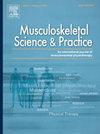全膝关节置换术后术前疼痛灾难和恢复力与功能和疼痛结果相关:系统综述
IF 2.2
3区 医学
Q1 REHABILITATION
引用次数: 0
摘要
背景:全膝关节置换术(TKA)是治疗终末期膝关节骨性关节炎的常见手术干预,但高达20%的患者报告对手术不满意。术前心理因素可能与术后预后有关,但它们之间的关系尚不清楚。目的探讨原发性全膝关节置换术患者术前疼痛发生和恢复能力与术后预后的关系。系统文献综述。方法检索至2024年7月的5个数据库。包括调查术前疼痛灾难或恢复力与术后结果之间相关性的研究。研究选择按照系统评价和荟萃分析的首选报告项目(PRISMA)指南进行。使用乔安娜布里格斯研究所关键评估清单评估方法学质量。个别研究的结果被提取出来,并通过叙述和表格综合来描述。将术前心理指标与术后结果进行分组比较。结果纳入14项研究(2506例患者)。在大多数研究中,疼痛灾难表现出与术后疼痛强度和自我报告功能一致的相关性。在一些研究中,较低的术前恢复力与术后自我报告的功能和身体表现降低有关。然而,疼痛灾难和恢复力都没有显示出与身体表现、镇痛需求、心理测量结果或住院时间的相关性。本综述发现,术前疼痛灾难与术后疼痛和功能预后一致相关,而与恢复力的关系则不太确定。这些发现提示术前心理筛查的潜在价值,特别是对于疼痛灾难,以确定可能从有针对性的干预中受益的患者。本文章由计算机程序翻译,如有差异,请以英文原文为准。
Pre-operative pain catastrophising and resilience correlate with function and pain outcomes following total knee arthroplasty: A systematic review
Background
Total knee arthroplasty (TKA) is a common surgical intervention for end-stage knee osteoarthritis, yet up to 20 % of patients report dissatisfaction with surgery. Pre-operative psychological factors may be associated with post-operative outcomes, yet their relationship remains unclear.
Objectives
To examine the correlation between pre-operative pain catastrophising and resilience with post-operative outcomes in primary total knee arthroplasty patients.
Design
Systematic literature review.
Method
Five databases were searched until July 2024. Studies investigating correlations between pre-operative pain catastrophising or resilience and post-operative outcomes were included. Study selection was performed in accordance with the Preferred Reporting Items for Systematic Reviews and Meta-Analyses (PRISMA) guidelines. Methodological quality was assessed using the Joanna Briggs Institute Critical Appraisal Checklist. Results of individual studies were extracted and described through narrative and tabular synthesis. Study comparisons between pre-operative psychological measures and post-operative outcomes were grouped and reported on.
Results
Fourteen studies (2,506 patients) were included. Pain catastrophising showed consistent correlations with post-operative pain intensity and self-reported function in most studies. Lower pre-operative resilience was associated with reduced post-operative self-reported function and physical performance in some studies. However, neither pain catastrophising nor resilience demonstrated correlations with physical performance, analgesic requirements, psychometric outcomes, or length of hospital stay.
Conclusions
This review found that pre-operative pain catastrophising consistently correlates with post-operative pain and functional outcomes, while the association with resilience was less conclusive. These findings suggest potential value in pre-operative psychological screening, particularly for pain catastrophising, to identify patients who may benefit from targeted interventions.
求助全文
通过发布文献求助,成功后即可免费获取论文全文。
去求助
来源期刊

Musculoskeletal Science and Practice
Health Professions-Physical Therapy, Sports Therapy and Rehabilitation
CiteScore
4.10
自引率
8.70%
发文量
152
审稿时长
48 days
期刊介绍:
Musculoskeletal Science & Practice, international journal of musculoskeletal physiotherapy, is a peer-reviewed international journal (previously Manual Therapy), publishing high quality original research, review and Masterclass articles that contribute to improving the clinical understanding of appropriate care processes for musculoskeletal disorders. The journal publishes articles that influence or add to the body of evidence on diagnostic and therapeutic processes, patient centered care, guidelines for musculoskeletal therapeutics and theoretical models that support developments in assessment, diagnosis, clinical reasoning and interventions.
 求助内容:
求助内容: 应助结果提醒方式:
应助结果提醒方式:


